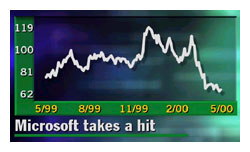|
Microsoft 3-way split unlikely
|
 |
May 25, 2000: 6:09 p.m. ET
Justice, states likely to retain recommendation for 2-way split
|
NEW YORK (CNNfn) - The Justice Department and the 19 states suing Microsoft Corp. in a landmark antitrust trial are likely to stick with their earlier proposal to divide the company in two, rather than taking the dramatic step of recommending a three-way split, government officials and legal experts said Thursday.
On Wednesday, federal Judge Thomas Penfield Jackson ordered the Justice Department to submit a revised proposal for breaking up Microsoft by Friday. 
Concern about the government's next move sent shares of the software giant tumbling 6.2 percent Thursday to 61-1/2 - the lowest level in more than a year.
Goldman Sachs software analyst Rick Sherlund, one of the most influential analysts on Wall Street and one of the financial advisors to Microsoft when it went public in 1986, called Wednesday's legal proceedings "a stunning defeat" and predicted Microsoft's stock price could lose as much as 15 percent of its value if the company is forced to break up.
Minor changes expected
One change Jackson recommended was to modify the way the government defines "Microsoft" in its remedy proposal to include the company's officers, directors, employees, and assignees. Another was to increase the amount of stock one person would be allowed to hold in both parts of a split-up Microsoft to 5 percent from 3 percent, partly to accommodate Microsoft co-founder Paul Allen, who is not affiliated with the company but holds substantial amounts of its stock. 
"My interpretation of where the judge was leading was that he wasn't expecting substantive changes," said Iowa Attorney General Tom Miller. "However, I can't speak on behalf of the other states and can't say for sure what the states and the Justice Department will do Friday."
"The revised remedy proposal is likely to contain only technical changes and, thus, be a non-event," said University of Baltimore Law School Professor Robert Lande. "I don't believe for a second that the government will shift to a three-way split from a two-way one. They need to maintain consistency."
"However, the level of detail in the judge's questions about the government's proposed remedy leads me to believe he is serious about a breakup," Lande said.
Should the government break up Microsoft? Take our poll.
Jackson gave Microsoft 48 hours to respond to the revised remedies filing. That would give Microsoft until the close of business Wednesday, since Monday is a holiday in the U.S., an administrative assistant to Judge Jackson said. The judge would be free to issue a final ruling at any point after receiving Microsoft's comments.
Brief recommends three-way split
During Wednesday's hearing, Judge Jackson praised a friend of the court brief filed by Computer and Communications Industry Association and Software and Information Industry Association, calling it "excellent." That brief recommends separating Microsoft into three companies rather than two. Those would be a Windows operating system company, an applications company, and a company that would hold Microsoft's Internet Explorer Browser.
"If Microsoft's applications company retains Internet Explorer without limitation, that company will retain control over the critical link between the productivity applications monopoly it now has and the monopolies over Internet computing and the server market that Microsoft has sought to acquire," the trade associations' brief said.
In other words, if one company controlled the look and feel of the dominant Web browser, that could have a large impact on the type of applications that run on corporate Web servers. While Judge Jackson hasn't tipped his hand about whether he favors a two-way split, a three-way one, or any split at all, his praise of the trade associations' brief showed that the document is influencing his thinking.
Along the same lines, Judge Jackson asked the attorneys representing the federal government and the states why a division of Microsoft into two companies would "inspire competition," instead of creating one company with a monopoly over PC operating systems and one with a near monopoly over desktop productivity applications, such as Microsoft Office.
In defense of their proposal, government lawyers said splitting Microsoft into two pieces would provide an incentive for the newly formed applications company to develop versions of its Office for use with operating systems other than Microsoft's Windows.
The government decided against a three-way split for fear it would have "time consuming, disruptive effects," on Microsoft and the industry as a whole, the government's lead attorney David Boies said. He added that a two-way division "directly met the case that was before the court."
Impact on stock's value
Analysts have attached a wide range of values to a broken up Microsoft, although most believe that a split would harm the value of its franchise.
"We don't subscribe to the view that breaking up Microsoft increases the value," said Paul Dravis of Banc of America Securities.
"This is unlike Standard Oil or AT&T, where there were physical assets. This is an intellectual property-focused case, so it's about people and software," Dravis said. 
In an appearance on CNNfn television, Goldman's Sherlund said while it is possible Microsoft may win the case on appeal, the outcome of the appeals process is impossible to predict and investors should prepare for the possibility of a breakup. (115K WAV 115KAIF).
"Basically, the key is going to be the appeal process," UBS Warburg analyst Andrew Roskill said in an interview with CNNfn.com. "I don't really see how this is anything different. I don't think anybody's assuming that the company's going to get broken up."
"Right now, the stock is just being driven by government propaganda," Roskill said. "I think come the fall election, getting a more reasonable judge involved in this case will get this thing resolved," Roskill said.
There would be few tears among Microsoft's competitors should the company be dismantled, given Jackson's finding that the company used its monopoly over PC operating systems to choke rival Netscape Communications, now owned by America Online, and impede product development efforts at Sun Microsystems, Apple Computer, and chip maker Intel. 
|
|
|
|
|
 |

|

